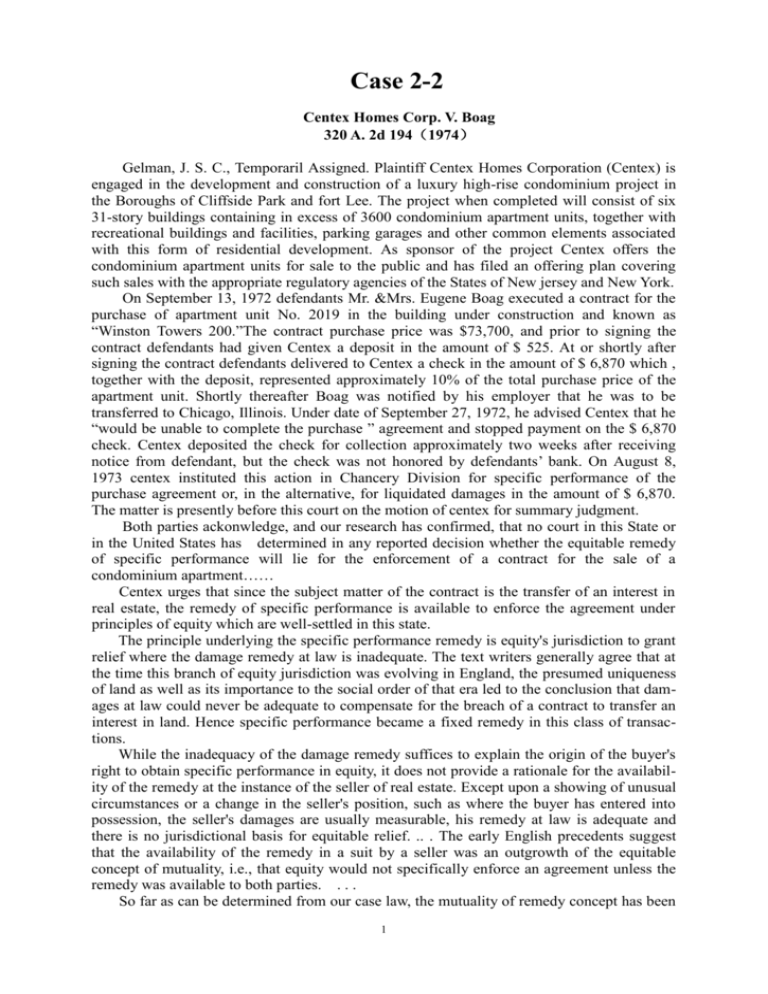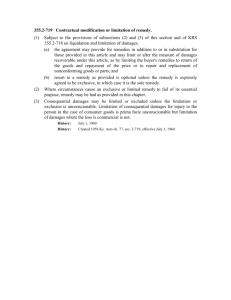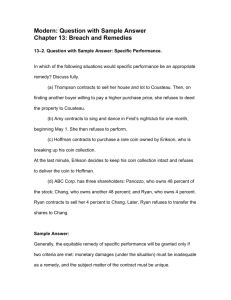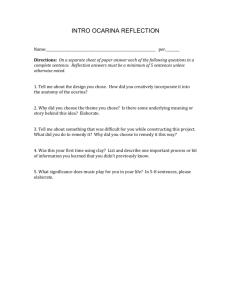Centex Homes Corp. V. Boag
advertisement

Case 2-2 Centex Homes Corp. V. Boag 320 A. 2d 194(1974) Gelman, J. S. C., Temporaril Assigned. Plaintiff Centex Homes Corporation (Centex) is engaged in the development and construction of a luxury high-rise condominium project in the Boroughs of Cliffside Park and fort Lee. The project when completed will consist of six 31-story buildings containing in excess of 3600 condominium apartment units, together with recreational buildings and facilities, parking garages and other common elements associated with this form of residential development. As sponsor of the project Centex offers the condominium apartment units for sale to the public and has filed an offering plan covering such sales with the appropriate regulatory agencies of the States of New jersey and New York. On September 13, 1972 defendants Mr. &Mrs. Eugene Boag executed a contract for the purchase of apartment unit No. 2019 in the building under construction and known as “Winston Towers 200.”The contract purchase price was $73,700, and prior to signing the contract defendants had given Centex a deposit in the amount of $ 525. At or shortly after signing the contract defendants delivered to Centex a check in the amount of $ 6,870 which , together with the deposit, represented approximately 10% of the total purchase price of the apartment unit. Shortly thereafter Boag was notified by his employer that he was to be transferred to Chicago, Illinois. Under date of September 27, 1972, he advised Centex that he “would be unable to complete the purchase ” agreement and stopped payment on the $ 6,870 check. Centex deposited the check for collection approximately two weeks after receiving notice from defendant, but the check was not honored by defendants’ bank. On August 8, 1973 centex instituted this action in Chancery Division for specific performance of the purchase agreement or, in the alternative, for liquidated damages in the amount of $ 6,870. The matter is presently before this court on the motion of centex for summary judgment. Both parties ackonwledge, and our research has confirmed, that no court in this State or in the United States has determined in any reported decision whether the equitable remedy of specific performance will lie for the enforcement of a contract for the sale of a condominium apartment…… Centex urges that since the subject matter of the contract is the transfer of an interest in real estate, the remedy of specific performance is available to enforce the agreement under principles of equity which are well-settled in this state. The principle underlying the specific performance remedy is equity's jurisdiction to grant relief where the damage remedy at law is inadequate. The text writers generally agree that at the time this branch of equity jurisdiction was evolving in England, the presumed uniqueness of land as well as its importance to the social order of that era led to the conclusion that damages at law could never be adequate to compensate for the breach of a contract to transfer an interest in land. Hence specific performance became a fixed remedy in this class of transactions. While the inadequacy of the damage remedy suffices to explain the origin of the buyer's right to obtain specific performance in equity, it does not provide a rationale for the availability of the remedy at the instance of the seller of real estate. Except upon a showing of unusual circumstances or a change in the seller's position, such as where the buyer has entered into possession, the seller's damages are usually measurable, his remedy at law is adequate and there is no jurisdictional basis for equitable relief. .. . The early English precedents suggest that the availability of the remedy in a suit by a seller was an outgrowth of the equitable concept of mutuality, i.e., that equity would not specifically enforce an agreement unless the remedy was available to both parties. . . . So far as can be determined from our case law, the mutuality of remedy concept has been 1 the prop which has supported equitable jurisdiction to grant specific performance in actions by sellers of real estate. . . . The first reported discussion of the question occurs in Hopper v. Hopper, which was an action by a seller to compel specific performance of a contract for the sale of land. In answer to the contention that equity lacked jurisdiction because the seller had an adequate legal remedy, Chancellor Green said: "It constitutes no objection to the relief prayed for, that the application is made by the seller to enforce the payment of the purchase money, and not by the buyer to compel a delivery of the title. The seller has not a complete remedy at law. Pecuniary damages for the breach of the contract is not what the complainant asks, or is entitled to receive at the hands of a court of equity. He asks to receive the price stipulated to be paid for the land. The doctrine is well established that the remedy is mutual, and that the seller may maintain his bill in all cases where the purchaser would sue for a specific performance of the agreement." No other rationale has been offered by our decisions subsequent to Hopper, and specific performance has been routinely granted to sellers without further discussion of the underlying jurisdictional issue. .. Our present Supreme Court has squarely held, however, that mutuality of remedy is not an appropriate basis for granting or denying specific performance. The test is whether the obligations of the contract are mutual and not whether each is entitled to precisely the same remedy in the event of a breach... The disappearance of the mutuality of remedy doctrine from our law dictates the conclusion that specific performance relief should no longer be automatically available to a seller of real estate, but should be confined to those special instances where a seller will otherwise suffer an economic injury for which his damage remedy at law will not be adequate, or where other equitable considerations require that the relief be granted. ... As Chancellor Vroom noted in King v. Morford, whether a contract should be specifically enforced is always a matter resting in the sound discretion of the court. ... Here the subject matter of the real estate transaction—a condominium apartment unit— has no unique quality but is one of hundreds of virtually identical units being offered by a developer for sale to the public. The units are sold by means of sample, in this case model apartments, in much the same- manner as items of personal property are sold in the market place. The sales prices for the units are fixed in accordance with schedule filed by Centex as part of its offering plan, and the only variance as between apartments having the same floor plan (of which six plans are available) is the floor level or the building location within the project. In actuality, the condominium apartment units, regardless of their realty label, share the same characteristics as personal property. From the foregoing one must conclude that the damages sustained by a condominium sponsor resulting from the breach of the sales agreement are readily measurable and the damage remedy at law is wholly adequate. No compelling reasons have been shown by Centex for the granting of specific performance relief and its complaint is therefore dismissed as to the first count. Centex also seeks money damages pursuant to a liquidated damages clause in its contract with the defendants. It is sufficient to note only that under the language of that clause (which was authored by Centex) liquidated damages are limited to such moneys as were paid by defendant at the time the default occurred. Since the default here consisted of the defendant's stopping payment of his check for the balance of the down-payment, Centex's liquidated damages are limited to the retention of the "money paid" prior to that date, or the initial $ 525 deposit. Accordingly, the second count of the complaint for damage relief will also be dismissed. 2 Case 2-2 Questions and answers 1. What are the claims of the plaintiff in this case? Specific performance for the Boags to purchase the apartment on the terms agreed upon , or, alternatively, payment of the liquidated damages which, in its opinion, should be $6,870 in addition to the $525 deposit already paid. 2. On what grounds does the plaintiff base its claim (s)? The subject matter of the contract is the purchase of real property(不动产). For disputes arising out of real property sales the equitable relief of specific performance is available. 3. What is the rationale for equitable remedies in general? Equitable remedy is granted where the remedy at law is inadequate. 4. What is the rationale for specific performance(衡平法院强迫一个违反合同者的特定 履行或强 制履行令)in cases where the buyer of real property is the plaintiff? Real property is unique, i.e. if seller breaches the contract, it is unlikely that the buyer will get an identical piece from elsewhere. That is the rationale for specific performance in real estate transactions. 5. What is the rationale for specific performance in cases where the seller of real property is the plaintiff? The rationale is mutuality, which means that if buyer can have specific performance in the event of seller’s default, seller should also have the remedy of specific performance if buyer defaults. 6. Is the remedy of specific performance applicable in this case? Why or why not? No. Because the apartment the buyer has agreed to buy is not unique. There are thousands of almost identical apartments put up for sale by the developer. The developer uses model units in much the same way sellers of personal property use samples. In fact the apartments have many characteristics of personal property(personal estate 个人财产, 动产). 7. What is the opinion of the court with regard to the second count(诉讼理由,争论点) of plaintiff's claim? The court here dismissed the second count of plaintiff ’s claim, which was for the payment of the $6,870 as liquidated damages, because the contract clause provided that money already paid at the time of default should be regarded as payment of liquidated damages. the $6,870check was not “money already paid at the time of default”, because default occurred at the time when the defendant stopped payment on the check, and the only money already paid at that time was the $525 deposit. 8. What has the seller to prove in seeking specific performance of a real estate contract? He has to prove that without specific performance, he would suffer at an economic injury for which no remedy at law would be adequate, or that equitable considerations would require that remedy of specific performance be granted. 9. Translate into Chinese the sentence: "While the inadequacy of the damage remedy suf fices to explain the origin of the buyer's right to obtain specific performance in equity, it does not provide a rationale for the availability of the remedy at the instance of the seller of real estate." 违约补偿金不够, 这一点已足以说明购方为什么有权获得实际履行这种衡平救济, 但不 能成为不动产的买方获得这种救济的理由。 3







